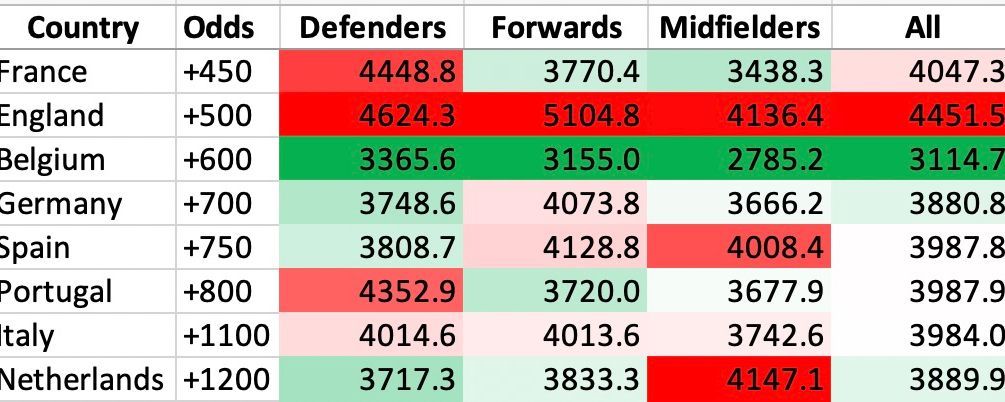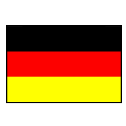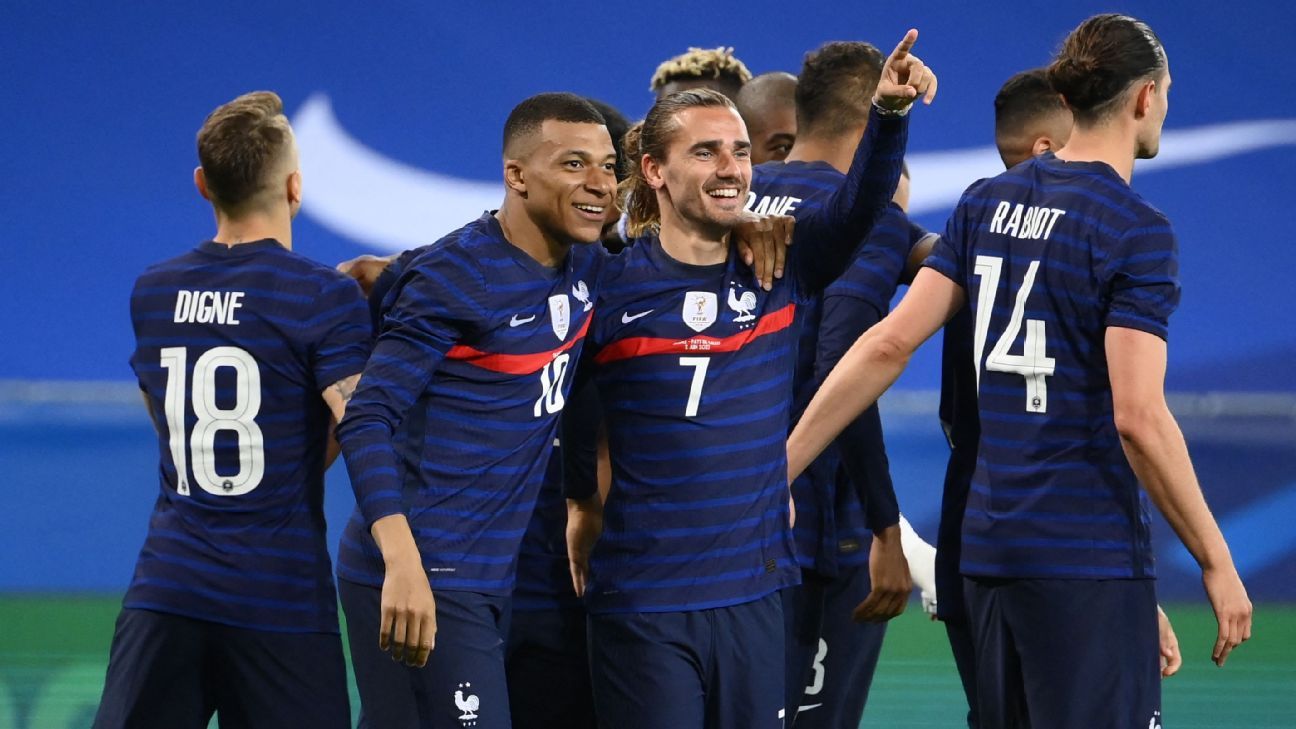One of the perks of writing for ESPN is the set of tools you have at your disposal. Our TruMedia soccer dashboard pulls in StatsPerform data from most of the world’s major leagues, plus a lot of club friendlies and basically every international match from the past decade-plus. (It also has World Cup data back to the 1960s and Euros data back to the 1980s and damn it, I’m going to figure out a way to work that into a piece of writing at some point.)
It might not have full match data for every player taking part in this summer’s European Championships, but it has a lot.
– Euro 2020 on ESPN: Stream LIVE games and replays (U.S. only)
– Euro 2020: Fixtures, ESPN live, match dates, times and venues
– European Soccer Pick ‘Em: Compete to win $10,000
It’s a good tool, then, for asking a simple question: Who has played way too many minutes over the past year? And, from there: Why is this important?
Omitting goalkeepers, from mid-June 2017 to mid-June 2018 — I used June 11 as the cutoff, since that’s when the Euros begin — 29 players logged over 5,000 minutes among all the competitions for which we have data. Only one topped 5,500: defender Fabian Balbuena (then of Corinthians, now of West Ham United).
In 2018-19, a sample that includes the last World Cup, the numbers increased a little bit: 33 players were over 5,000 minutes, and eight over 5,500: defenders Daley Blind, Toby Alderweireld, Richard Keogh, Matthijs de Ligt and Virgil van Dijk, midfielder Joshua Kimmich and attackers Dusan Tadic and Antoine Griezmann.
In 2019-20, the coronavirus stoppage changed the equation considerably. With most leagues pausing play from March to May, no one topped 5,000 minutes and only two — Kimmich and Corinthians defender Gil — topped 4,500. That stoppage, however, created a glut. Most leagues resumed play in the summer, finished in July or August, then began their next seasons in September. International play continued. The Europa and Champions Leagues were crammed in there, too.
It has been a year of fixture congestion and soft-tissue injuries; now, after the briefest of breaks, the Euros begin next Friday.
We’re heading into the second-biggest international competition with 76 players having logged at least 5,000 minutes, 26 over 5,500 and four over 6,000: England‘s Harry Maguire, Portugal‘s Bruno Fernandes and Ruben Dias and Scotland‘s Andy Robertson, all of whom play in the Premier League for teams that made deep runs in UEFA competitions. Maguire missed time in May due to injury and still led all comers with 6,345 minutes played. That’s the equivalent of 70.5 full matches in basically 11 months!
It’s obviously difficult to predict soft-tissue injuries and wear-and-tear problems, but it might still be instructive to look at the teams most likely to run into these issues based on these absurd minutes totals.
Jump to: France | England | Belgium | Germany | Spain | Portugal | Italy | Netherlands
Let’s begin by looking simply at the number of players from each team who have logged at least 5,000 minutes in the past year. (Again, these numbers might not be perfectly comprehensive, but they’re close.)
6: England, Italy
5: France
4: Netherlands, Spain
3: Belgium, Denmark, Portugal
2: Austria, Germany, Scotland, Switzerland
1: Croatia, Czech Republic, Hungary, Poland, Turkey, Wales
0: Finland, North Macedonia, Russia*, Slovakia, Sweden, Ukraine
* Russia is the biggest league for which we don’t have data for, but it’s worth noting that the season lasts only 30 matches, which limits the opportunity to top 5,000 minutes.
As one might expect, those with more players on preeminent teams that go deep in European competitions have more players with tired legs right now. But let’s dial a bit further in as it pertains to the competition’s favorites.
According to Caesars, eight countries have odds of +1200 or better for winning the Euros: France (+450), England (+500), Belgium (+600), Germany (+700), Spain (+750), Portugal (+800), Italy (+1100) and Netherlands (+1200). Those odds are equivalent to between an 8% and 18% chance of winning. From there, the odds jump significantly — Denmark is next at +2800 (3%), while Finland and North Macedonia bring up the rear at +50000 (0.2%). So let’s focus on the top eight.
Average minutes played by position unit (June 2020 to present):


Most minutes played: GK Hugo Lloris (6,225), DF Jules Koundé (5,699), FW Antoine Griezmann (5,542), DF Clement Lenglet (5,216), DF Raphael Varane (5,144), FW Karim Benzema (4,995), MF Adrien Rabiot (4,947), FW Kylian Mbappe (4,650), DF Lucas Digne (4,514), MF Paul Pogba (4,472)
Aside from goalkeepers, defenders tend to make up a large percentage of players with the most minutes, but only England’s defenders have put more miles on their collective odometer in the past year than France’s. That said, a few key figures could be fresh.
Bayern players Benjamin Pavard and Lucas Hernandez are both under 4,000 minutes, while Chelsea‘s Kurt Zouma (4,074) is barely beyond that pretty common threshold, and the team is pretty free of wear and tear up front. Veterans Griezmann and Benzema have logged huge minutes, but Mbappe missed some playing time with injury (which could pay off now) and basically every other forward — Kingsley Coman, Wissam Ben Yedder, Ousmane Dembele, Marcus Thuram, Olivier Giroud — are all either below 3,000 minutes or barely over.
“Sneaky fresh” star: N’Golo Kante. The man of the match in the Champions League final, Kante was dealing with nagging injuries at the end of the season, but it didn’t stop him from dominating, and earlier time off means he has played under 4,200 minutes over the past year.

Most minutes played: DF Harry Maguire (6,545), MF Mason Mount (5,768), FW Marcus Rashford (5,498), FW Harry Kane (5,479), FW Raheem Sterling (5,096), DF Conor Coady (5,014), DF Kyle Walker (4,969), MF Bukayo Saka (4,779), MF Declan Rice (4,756)
Manchester United played in the Europa League finals, while Chelsea and Manchester City played in the Champions League finals. The England squad features 11 players from these three clubs. Five of them are at or near 5,000 minutes, as is the team captain, Harry Kane, coming off of an otherworldly season. It will be fascinating to see if or how manager Gareth Southgate manages minutes with this in mind.
England don’t necessarily have an “off-match” — they start with World Cup runner-up Croatia, then face neighbor Scotland, and the stakes of the final match against Tomas Soucek‘s Czech Republic are obviously not yet clear — but does Southgate simply play his best 11 out of the gates and hope for the best? Does he lean on England’s fantastic depth and spread the minutes around? It’s fair to assume the former, but there’s obvious risk either way.
“Sneaky fresh” star: Jack Grealish and Jadon Sancho. England’s two most creative players are both under 3,700 minutes for the season. In what might be the most heavy-legged team in the tournament, their form — and it bears mentioning that Sancho’s best play all season came in recent weeks — could make a massive difference.

Most minutes played: GK Thibaut Courtois (5,940), MF Youri Tielemans (5,900), FW Romelu Lukaku (5,589), DF Toby Alderweireld (4,656), MF Kevin De Bruyne (4,541), GK Simon Mignolet (4,162), DF Timothy Castagne (3,993), DF Jan Vertonghen (3,978), MF Leander Dendoncker (3,895), DF Jason Denayer (3,730)
Two of Belgium’s most vital pieces — Tielemans and Lukaku — are both very much in the “heavy usage” department, but as you see from the table above, this team is fresh compared to the other primary contenders. That’s good, too, because this team is also banged up and old. Six of the squad’s 26 players are 32 or older, eight more are at least 29 and only four — Leicester City stars Tielemans and Castagne, Lyon defender Jason Denayer and Rennes teenager Jeremy Doku — are under 26.
The talent is blatantly clear; Belgium boast maybe the best creator (De Bruyne) and one of the best strikers (Lukaku) in the world. But De Bruyne will miss the beginning of the tournament after suffering multiple fractures to his face in the Champions League final, Eden Hazard has rarely been healthy in recent seasons and other contributors, like Axel Witsel, are coming off of injuries. Form could be an issue, even if minutes and skill are not.
“Sneaky fresh” star: Hazard. The 30-year-old’s injury problems with Real Madrid are extremely well-documented — he has logged only 1,318 total minutes (14.6 matches) in the past 12 months. But 250 of those minutes came over the final month of the club season, and if he finds his form, he’s still Eden Hazard.

Most minutes played: GK Manuel Neuer (5,521), DF Matthias Ginter (5,233), MF Ilkay Gundogan, GK Bernd Leno (4,777), DF Robin Gosens (4,766), DF Antonio Rudiger (4,704), FW Timo Werner (4,693), DF Mats Hummels (4,615), MF Joshua Kimmich (4,547), FW Thomas Muller (4,526)
Germany are a total wild card in this tournament: Group F boasts the past two World Cup champions (France and Germany), the defending Euros champion (Portugal) and poor Hungary. Die Mannschaft combines an absurdly deep midfield, plenty of attacking quality (despite Timo Werner’s poor run of finishing) … and a defense that doesn’t have a lot of miles on its legs but also doesn’t quite have the same standout talent as the rest of the squad. Do they have the legs to play the type of attacking football they want without leaving their back line constantly exposed?
“Sneaky fresh” star: Leroy Sane. Sane’s first season at Bayern, following his August 2019 ACL tear, was perfectly fine — 10 goals and 45 chances created in all competitions — and better yet, he played on a team that has the deepest collection of winger talent in the world. He played in 41 matches, but averaged only about 60 minutes per appearance. He’s at barely more than 3,000 minutes over the past 12 months. (For that matter, fellow Bayern winger Serge Gnabry‘s only at 3,600.)
For a team that will probably have to score a lot to win the tournament, Sane’s contributions could be vital, and he should have the legs for it.

Most minutes played: DF Jordi Alba (5,568), GK Unai Simón (5,422), DF Pau Torres (5,415), MF Rodri (5,203), MF Koke (4,969), MF Sergio Busquets (4,887), Cesar Azpilicueta (4,643), GK David de Gea (4,575), MF Marcos Llorente (4,572), FW Gerard Moreno (4,568)
Spain still has a couple of old Barcelona stalwarts in Sergio Busquets and Jordi Alba, who are both 32 and have combined for more than 10,000 minutes in the past year. They get plenty of other veteran influence, too, from the likes of Cesar Azpilicueta, Thiago, Koke et al. There is also, however, an enigmatic and intriguing set of younger players with unique skill sets and influences and, on average, reasonably fresh legs, like Rodri, Adama Traore, Dani Olmo, Ferran Torres and Pedri.
If Luis Enrique wanted to field a lineup with most of the traits of the Spanish team that won everything a decade or so ago, he could do that. But if he wanted to get weird, he could do that too. I will personally always root for the latter, but I’m not and will never be a national team manager.
“Sneaky fresh” star: Thiago. The 29-year-old played maybe the best ball of his long Bayern tenure at the very end of it, serving as both a facilitator and occasional tactical fouler for the Champions League winners. Then he left for Liverpool, got COVID-19, injured his knee and barely played for months. He created just one goal and no assists in 30 matches for his new club, but he also has fewer than 3,000 minutes on his legs since last June. A fresh and hungry Thiago can do wonders for any squad in the world.

Most minutes played: MF Bruno Fernandes (6,345), DF Ruben Dias (6,088), FW Cristiano Ronaldo (5,779), GK Rui Silva (4,950), GK Rui Patrício (4,769), DF Joao Cancelo (4,668), MF Bernardo Silva (4,562), GK Anthony Lopes (4,440), DF Nelson Semedo (4,332), MF Ruben Neves (4,214)
Portugal won the Euros in 2016 and now get to field what is, on paper, a more talented squad. Bruno Fernandes is maybe the best attacking midfielder in Europe, Ruben Dias is one of the best centre backs and Cristiano Ronaldo keeps, well, being Cristiano Ronaldo. Of course, those three players have combined for more than 18,000 minutes in the past year. Eighteen thousand! Manchester City stalwarts Joao Cancelo and Bernardo Silva are excellent, but both men are over 4,500 as well.
There’s a core of younger and more rested attackers — the Joao Felixes and Diogo Jotas and Andre Silvas of the world — who will need to make timely contributions if this team’s going to make another deep run. But heavy legs aside, there’s so much to like about this squad.
“Sneaky fresh” star: Joao Felix. The 21-year-old is still finding his way at Atletico Madrid — he scored three goals in eight Champions League matches, but only seven in La Liga play — but if you’re looking for a moment of inspiration, especially late in a match, he’s as likely as anyone to provide it, and he’s got fewer than 3,400 minutes on his legs over the past year.

Most minutes played: GK Gianluigi Donnarumma (6,437), MF Nicolo Barella (5,546), DF Giovanni Di Lorenzo (5,436), FW Lorenzo Insigne (5,426), DF Francesco Acerbi (5,306), DF Alessandro Bastoni (5,204), FW Ciro Immobile (4,682), MF Lorenzo Pellegrini (4,510), DF Rafael Toloi (4,504), MF Manuel Locatelli (4,491)
The minutes are pretty top-heavy for the Azzurri: six guys are over 5,200 minutes, but it’s a pretty friendly distribution from there. This is a deep roster without too many fatigue issues. It’s relatively young, too, at least by Italian standards. Only five players are over 30, and eight, including Donnarumma, Juventus‘ Federico Chiesa and Inter’s Nicolo Barella, are under 25.
Yet the talent distribution itself is a concern. Italy has loads of strong professionals, but not as many “best in Europe” candidates as the teams above. Still, Roberto Mancini certainly has options, and Italy’s in a relatively manageable group with Switzerland, Turkey and Wales.
“Sneaky fresh” star: Domenico Berardi. Instant offense. In the past 12 months, Berardi has scored 22 goals with 12 assists in 41 Serie A matches for Sassuolo, and he has scored four more in just 265 minutes with the national team. A couple of minor injuries kept him on the sideline here and there, though, and he has played only 3,641 minutes in this span. If Italy advances deep into the tournament, he’s probably a major reason.

Most minutes played: MF Frenkie de Jong (5,885), MF Georginio Wijnaldum (5,559), DF Stefan de Vrij (5,453), MF Marten de Roon (5,359), GK Tim Krul (4,840), MF Davy Klaassen (4,761), MF Ryan Gravenberch (4,637), DF Owen Wijndal (4,504), DF Matthijs de Ligt (4,412), FW Memphis Depay (4,359)
Frank de Boer’s squad drew an extremely manageable group (Austria, Ukraine, North Macedonia), which could conceivably allow him to juggle minutes in the midfield. That would be helpful because while only seven players have recorded over 4,600 minutes in the past 12 months, five are nominally midfielders: Barcelona’s de Jong, Liverpool’s (for now) Wijnaldum, Atalanta‘s de Roon and the Ajax duo, Klaassen and Gravenberch.
If that’s an issue that you can work around, this is a particularly interesting squad of peak-age talent and exciting youngsters. Whether there’s enough raw talent to win the whole thing, we’ll see, but there are likable ingredients, and only a few have tired legs.
“Sneaky fresh” star: Donny van de Beek. Manchester United’s confusion could be the national team’s gain. Van de Beek was incredible for Ajax, and he has played every position from winger to defensive midfield for his country through the years. As a Red Devil, he has logged only 1,550 minutes, often as a sub, and his creation numbers have suffered. But he’s back with the home team, and he’s rested.
